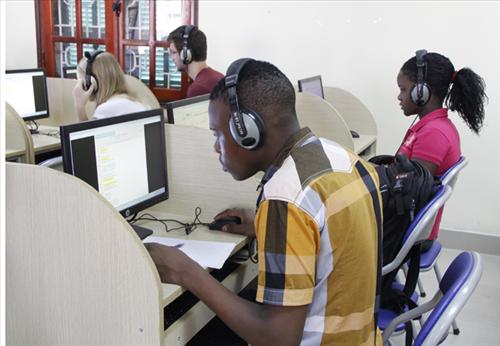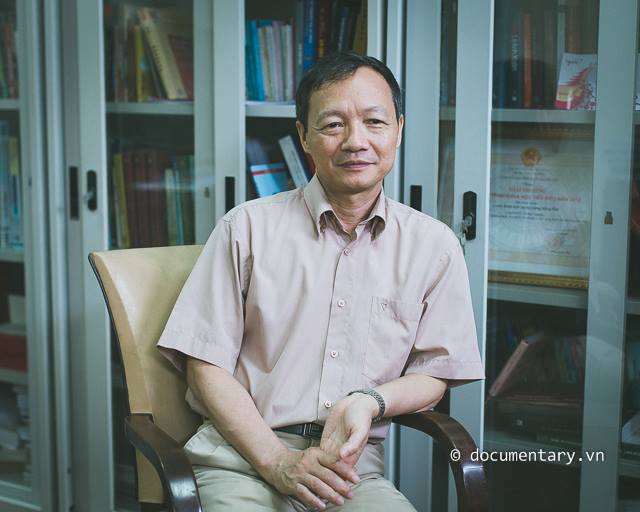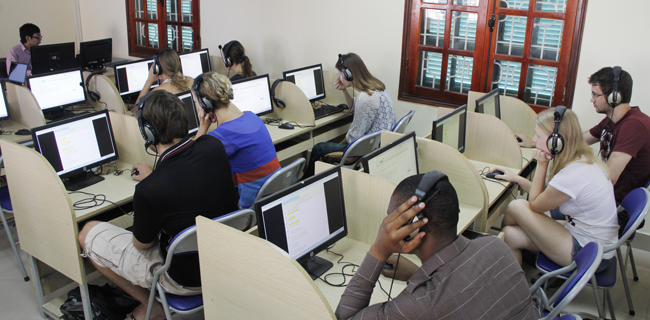

Prof. Dr. Vu Duc Nghieu / Photo: Thanh Long
- Sir, what practical reasons led the University of Social Sciences and Humanities (Vietnam National University, Hanoi) to develop a set of standards for assessing the Vietnamese language proficiency of international students? What are some Vietnamese language proficiency tests and assessment materials for foreign students?
Professor Vu Duc Nghieu:In fact, our desire to establish a standardized system and assessment tests for Vietnamese language proficiency for foreign learners has existed for a long time. The reason is that the science of language teaching worldwide has been developing rapidly; the methods and approaches to testing, assessing, and determining foreign language proficiency have been changing and evolving significantly. In the field of teaching Vietnamese as a foreign language, we need to adapt to keep pace with and align with international advancements in this area of testing and assessment.
The University of Social Sciences and Humanities has a long tradition of teaching Vietnamese, dating back to the early days of the founding of Hanoi University. Currently, the number of people learning Vietnamese as a foreign language, both within and outside Vietnam, as well as at the university itself, is increasing significantly. Therefore, developing a set of standards for evaluating and determining students' Vietnamese language proficiency has become an urgent and necessary undertaking.
Therefore, the Vietnam National University, Hanoi, Vietnam National University, Vietnam National University, Vietnam National University, directed, assigned responsibility, and created favorable conditions for us to organize and implement the project to develop this set of assessment standards and assessment test questions.
- All forms of assessment aim to accurately evaluate students' abilities and create the most favorable conditions for organizing exams. In these two aspects, what are the outstanding advantages of this new examination method compared to the old one, sir?
Professor Vu Duc Nghieu:Regarding the purpose of assessment, that's correct; the goal is to accurately evaluate the abilities and proficiency of learners. With the new testing method, the assessment results are more objective because the criteria and specific tests will include more content assessing language skills and language proficiency than the assessment methods we have used before.
Furthermore, the traditional approach has been to assess proficiency by assigning questions at the appropriate level to determine if students have achieved that level. This new approach, however, is based on a system of 10 standards comprising 51 criteria. Each exam is a "spectrum" of questions and requirements spanning from the first to the last level (according to the 6-level, 3-level scale of the European Framework of Reference). Test-takers are free to demonstrate their language abilities; finally, automated scoring using technology will determine the score and proficiency level achieved.
In terms of organization and assessment methods, with the support of information technology, the work will certainly be much more convenient in many aspects, from the organizational space to the organizational personnel, the scoring method, and the calculation of scores. The goal we are aiming for is: anyone, anywhere, anytime can register and take the assessment, as long as they want to and are sitting at a computer with an internet connection.

Foreign students taking a trial proficiency test using a new method at the University of Social Sciences and Humanities / Photo: Huong Giang
- How does the knowledge content structured and combined in this set of standards and exam questions differ from the question bank of the old exam method, sir?
Professor Vu Duc Nghieu:Different, but not absolutely different, and certainly not a rejection of the old-style question banks. The difference lies in the means and methods of conducting the assessment. Here, the abilities demonstrating language skills—speaking, listening, reading, and writing—are tested through various "tests" and revealed through different requirements and "challenges." This is implicitly reflected in the test questions; and test-takers will demonstrate their full language abilities through their work.
- During the trial exam, international students liked the new exam format, but some also commented that the questions were slightly more difficult than the traditional exam, and there were occasional system glitches. What are your thoughts on these feedbacks?
Professor Vu Duc Nghieu:That's normal; and that's very useful information for us, although we anticipated it. We don't have much tradition or experience in organizing and conducting this type of assessment. We will carefully analyze everything to continue learning, making adjustments, and supplementing our work on the long-term path ahead.
- With this exam format, how will the registration and certification process be handled?
Professor Vu Duc Nghieu:This, given today's information technology, shouldn't be any significant difficulty. There are specific instructions on the website regarding the online registration procedure for taking the test. It's easy.
- When conducting research and implementing this project, what was the biggest challenge that the expert team had to overcome?
Professor Vu Duc Nghieu:We all face difficulties, especially in terms of resources. But I don't want to talk about the difficulties; instead, I want to emphasize the unimaginable conditions and spirit of the team members who carried out this project. Our team consists of 11 people: Ms. Nguyen Viet Huong, Ms. Nguyen Thi Thuan, Mr. Nguyen Chi Hoa, Mr. Tran Nhat Chinh, Mr. Vu Van Thi, Mr. Nguyen Hong Con, Mr. Nguyen Van Phuc, Mr. Dao Van Hung, Mr. Nguyen Thien Nam, Mr. Nguyen Van Hieu, and myself. As the person in charge of leading this project, I am very grateful to all the team members. If each of us had reduced our efforts even a little, I certainly wouldn't have anything to say to you today.
- The University of Social Sciences and Humanities has over 45 years of tradition in teaching Vietnamese to foreigners, and is one of the few institutions officially entrusted with organizing the assessment of Vietnamese language proficiency for foreigners; so what is the significance of organizing assessments in this new way for the innovation of the University's training programs?
Professor Vu Duc Nghieu:Even without me saying it, you've probably already noticed. The assessment process will be more comprehensive, flexible, and adaptable in its organization and implementation, making it easier for those who want to participate in the assessment.
One of the tasks needed for comprehensive educational reform today is to reform assessment methods. This reform should focus on the way assessment is organized and implemented to achieve more accurate and better evaluations of competence, knowledge, and skills, not simply on whether or not computers and information technology are used. In the context of this discussion, computers and information technology are powerful and effective tools and technological means to support assessment methods or teaching and learning activities.
ButThank you, teacher, for the discussion.
Author:Thanh Ha
Newer news
Older news